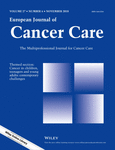Effects of health-related quality of life on health service utilisation in patients with colorectal neoplasms
Funding information
Financial support for this study was provided in part by Small Project Funding (Project code 200907176135) from the University of Hong Kong, and Health and Health Service Research Fund (HHSRF #08090851) of the Food and Health Bureau, HKSAR. The funding agreement ensured the authors’ independence in designing the study, interpreting the data, and writing and publishing the report.
Abstract
This study was to assess the impact of HRQOL on health service utilisation using four different count data models. The HRQOL was measured using the Short-Form Six-Dimension instrument and the functional assessment of cancer therapy-colorectal whereas health service utilisation was measured by the number of monthly clinical consultations and the number of monthly hospitalisation. Different count data models (Poisson's regression, negative binomial regression, zero-inflated Poisson's regression and zero-inflated negative binomial regression) were used to assess the association between HRQOL and health service utilisation. A performance comparison was made between the models. Goodness-of-fit statistics (the Pearson's chi-squared test statistic, the Akaike and Bayesian information criteria) were used to determine the best-fitting model. The negative binomial model performed the best in assessing the association between HRQOL measures and health service utilisation in patients with colorectal neoplasm and thus recommended. Physical well-being of patients was negatively and significantly associated with the monthly rate of health service utilisation after controlling for patient demographics. Both physical and function well-beings of patients were negatively and significantly associated with the number of monthly hospitalisations. If the data for the condition-specific FACT-C are not available, SF-6D showed a very strong negative relationship with health service utilisation. Such models can be used to guide the allocation of clinical resources and funding for the care of colorectal cancer patients.
CONFLICT OF INTEREST
MY Wong, Yingsi Yang, Zhiqiang Cao, Vivian YW Guo, Cindy LK Lam and Carlos KH Wong declare that he/she has no conflict of interest.




